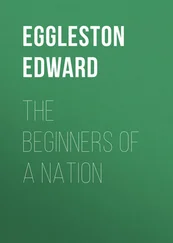Edward Eggleston - The Graysons - A Story of Illinois
Здесь есть возможность читать онлайн «Edward Eggleston - The Graysons - A Story of Illinois» — ознакомительный отрывок электронной книги совершенно бесплатно, а после прочтения отрывка купить полную версию. В некоторых случаях можно слушать аудио, скачать через торрент в формате fb2 и присутствует краткое содержание. Жанр: История, foreign_antique, foreign_prose, на английском языке. Описание произведения, (предисловие) а так же отзывы посетителей доступны на портале библиотеки ЛибКат.
- Название:The Graysons: A Story of Illinois
- Автор:
- Жанр:
- Год:неизвестен
- ISBN:нет данных
- Рейтинг книги:4 / 5. Голосов: 1
-
Избранное:Добавить в избранное
- Отзывы:
-
Ваша оценка:
- 80
- 1
- 2
- 3
- 4
- 5
The Graysons: A Story of Illinois: краткое содержание, описание и аннотация
Предлагаем к чтению аннотацию, описание, краткое содержание или предисловие (зависит от того, что написал сам автор книги «The Graysons: A Story of Illinois»). Если вы не нашли необходимую информацию о книге — напишите в комментариях, мы постараемся отыскать её.
The Graysons: A Story of Illinois — читать онлайн ознакомительный отрывок
Ниже представлен текст книги, разбитый по страницам. Система сохранения места последней прочитанной страницы, позволяет с удобством читать онлайн бесплатно книгу «The Graysons: A Story of Illinois», без необходимости каждый раз заново искать на чём Вы остановились. Поставьте закладку, и сможете в любой момент перейти на страницу, на которой закончили чтение.
Интервал:
Закладка:
Barbara, for one, had resolved to treat herself to a dollar and a quarter's worth of additional learning. The Timber Creek school-house was on the road leading to the village of Moscow; she could therefore catch a ride, now and then, on the wagon of some farmer bound to the village, by mounting on top of a load of wood, hay, or potatoes; and often she got a lift in the evening in a neighbor's empty wagon rattling homeward from town, or for a part of the way by sitting in the tail of some ox-cart plying between forest and prairie; but more frequently she had to walk both in going and coming, besides working early and late at her household duties.
Hiram Mason was the name of the new teacher whom the pupils found behind the master's desk on the first day of school. He was the son of a minister who had come out from New England with the laudable intention of lending a hand in evangelizing this great strapping West, whose vigorous and rather boisterous youth was ever a source of bewilderment, and even a cause of grief, to the minds of well-regulated Down-easters. The evangelists sent out aimed at the impossible, even at the undesirable, in seeking to reproduce a New England in communities born under a different star. Perhaps it was this peninsular trait of mind that prevented the self-denying missionaries from making any considerable impression on the country south of the belt peopled by the current of migration from New England. The civilization of the broad, wedge-shaped region on the north side of the Ohio River, which was settled by Southern and Middle State people, and which is the great land of the Indian corn, has been evolved out of the healthier elements of its own native constitution. But it was indebted to New England, in the time of its need, for many teachers of arithmetic and grammar, as well as for the less-admirable but never-to-be-forgotten clock-peddlers and tin-peddlers from Connecticut, who also taught the rustics of southern Ohio, Indiana, and Illinois things they had never dreamed of before, and took high pay for the instruction. Young Mason, though he had mostly grown up in the new country, and would have scorned the name of Yankee, had got from his father that almost superstitious faith in the efficacy of knowledge which, in the North-eastern States, has been handed down from generation to generation, and which has produced much learning and some pedantry. Mason was of middle stature, good breadth of shoulder, prominent, broad forehead, and brows that overhung his eyes, but were rather high above them. He had a well-set chin and a solid jaw; his mouth was too large to be handsome and was firmly closed; his gait was strong, straightforward, resolute, and unhurried. There were little touches of eccentricity in him: he had a way of looking at an interlocutor askance, and his habitual expression was one of mingled shyness and self-contained amusement. The religious enthusiasm of his father had been transmuted in him to a general earnestness of character, which was veiled under a keen perception of the droll side of life, derived from a mother of Southern extraction. His early-and-late diligence in study was the wonder of the country, but the tastes and aspirations that impelled him to so much toil rarely found utterance in any confessions, even to his nearest friends. Reserved as he was, the people could never complain that he held himself above them. A new-country youth, the son of a minister on slender pay, Hiram understood how to extend a helping hand, when occasion required, in any work that might be going on. At school, when the young master saw the boys playing at the boisterous and promiscuous "soak about," he would sometimes catch the contagion of the wild fun, and, thrusting his "Livy" into the desk, rush out of the door to mix in the confusion, throwing the yarn ball at one and another with a vigor and an accuracy of aim that doubled the respect of his pupils for him. But when once he had extricated himself from the mélée , and had rapped on the door-frame with his ruler, crying, "Books, books!" the boy who a minute before had enjoyed the luxury of giving the master what was known in school-boy lingo as a "sockdolager," delivered full in the back, or even on the side of the head, did not find any encouragement to presume on that experience in school-hours.
The new master's punishments usually had a touch of his drollery in them; he contrived to make the culprit ridiculous, and so to keep the humor of the school on his side. A girl who could not otherwise be cured of munching in school had to stand in front of the master's desk with an apple in her teeth; a boy who was wont to get his sport by pinching his neighbors, and sticking them with pins, was forced to make no end of amusement for the school in his turn, by standing on the hearth with a cleft stick pinching his nose out of shape. It was soon concluded that there was no fun in "fooling" with a master who was sure to turn the joke on the offender.
The older pupils who occupied the "writing bench," in front of a continuous shelf-like desk fixed along the wall, spent much of their time in smuggling from one to another fervid little love notes, which, for disguise, were folded like the "thumb-papers" that served to protect their books from the wear and tear of their over-vigorous thumbs, and from soiling. By passing books from one to another, with such innocent-looking square papers in them, a refreshing correspondence was kept up. This exchange of smuggled billets-doux was particularly active when Rachel Albaugh was present. As for the love-letters thus dispatched, they were fearfully monotonous and not worth the pains of capture by a schoolmaster. Some were straightforward and shameless declarations of admiration and affection in prose scrawls, but a very common sort was composed entirely of one or another of those well-worn doggerel couplets that have perhaps done duty since the art of writing became known to the Anglo-Saxons.
"If you love me as I love you,
No knife can cut our love in two,"
was a favorite with the swains of the country school-house; but
"The rose is red, the violet's blue,
Sugar's sweet, and so are you,"
had a molasses-like consistency in its alliterative lines that gave it the preference over all other love poems extant.
Amongst these unblushing scribblers of love doggerel and patient cutters and folders of many sorts of thumb-papers, whose fits of studying, like chills and fever, came on only "by spells," Barbara sat without being one of them. The last chance for education was not to be thrown away; and Mason soon singled out this rather under-sized, sharp-eyed girl, not only as the most industrious and clever of the pupils in the Timber Creek school, but as a person of quite another sort from the rest of them. When he was explaining anything to a group of half-listless scholars, her dark eyes, drawn to beads, almost startled him with their concentrated interest. She could not be taught in any kind of classification with the rest; her rate of progress was too rapid. So finding that Barbara studied all through the recess time, he undertook to give her extra instruction while the others were on the playground. The most agreeable minutes of his day were those in which he unfolded to her the prosaic principles of Vulgar Fractions, of Tare and Tret, and of the Rule of Three. This last was the great and final goal, and it was attained by few of those who attended an intermittent country school in that time. To reach it was to become competent to teach school. Barbara, with the help of the master, who directed her to save time by omitting some of the rubbish in Pike's Arithmetic, was soon in sight of this promised land of the Rule of Three, and it became a question of reviewing the book once more, when she should be through with it, so as to take rank among those who would certainly "do every sum in the book."
Читать дальшеИнтервал:
Закладка:
Похожие книги на «The Graysons: A Story of Illinois»
Представляем Вашему вниманию похожие книги на «The Graysons: A Story of Illinois» списком для выбора. Мы отобрали схожую по названию и смыслу литературу в надежде предоставить читателям больше вариантов отыскать новые, интересные, ещё непрочитанные произведения.
Обсуждение, отзывы о книге «The Graysons: A Story of Illinois» и просто собственные мнения читателей. Оставьте ваши комментарии, напишите, что Вы думаете о произведении, его смысле или главных героях. Укажите что конкретно понравилось, а что нет, и почему Вы так считаете.












